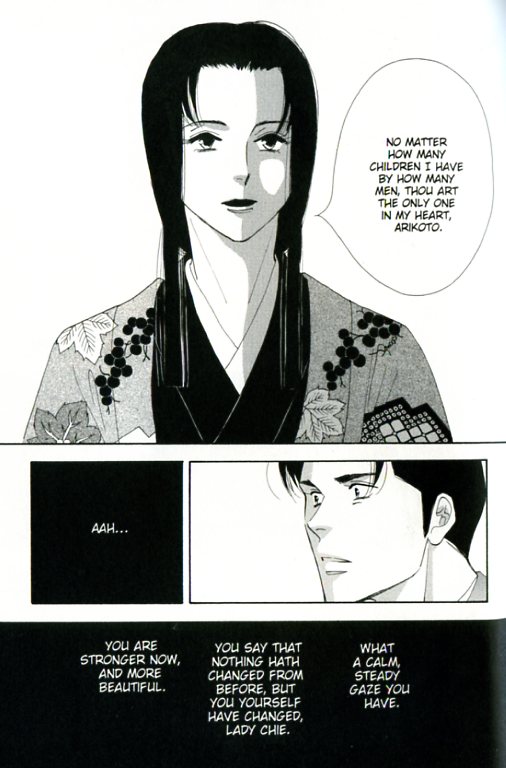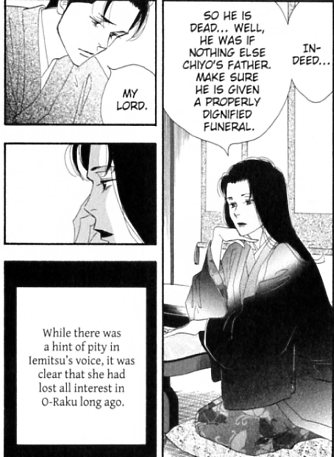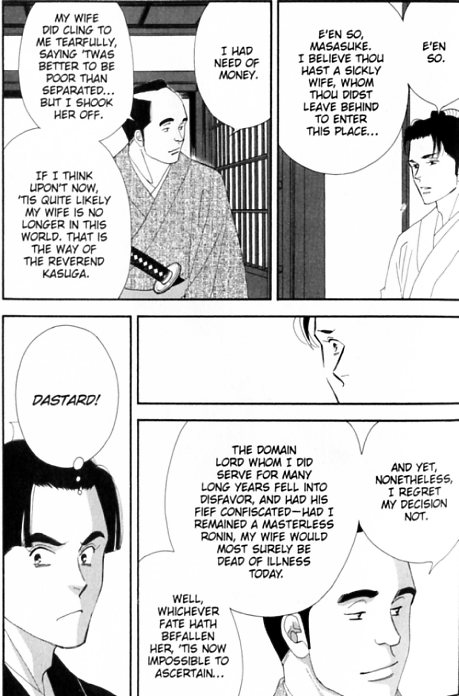In his discussion of Ooku, Suat argued that the book was a failure because it did not accurately reflect gender relations in historical Japan. Specifically, Suat felt that, were some significant percentage of the male population of Tokugawa-era Japan to die of illness, women would not move into positions of prominence, and certainly would not inherit the Shogunate and take over rule of the country, as Fumi Yoshinaga has them do in this series.
In the comments to Suat’s post, I replied that, personally, I really couldn’t care less what would or would not have happened had Ooku’s alternate reality “really” come true. To me the series was about relationships, love, and exploring both in the light of shifting gender expectations and realities. It’s Ursula K. Le Guin, not Hal Clement.
After reading Ooku volume 3, I stand by that — I still love the series, and it’s plausibility as “history” has little effect one way or the other on my enjoyment.
But..at the same time…it’s not quite right to say that history is unimportant to Ooku. Obviously, the setting matters a lot — though I disagree with Suat that plausibility is necessarily the only, or even the main, way to think about how history figures in the book. Or, to look at it another way, I think Suat dislikes the book because he sees human nature as being only so flexible. Yoshinaga, on the other hand, chooses to write about an alternate history precisely because she is fascinated with the way that time can shape individuals. Suat says, “this is what Japan was like.” Yoshinaga says, with James Brown, “time will take you on.”
As an example:
This is perhaps the emotional high point of volume 3. Iemitsu, the female shogun, is in love with Akimoto, but because he is barren and she needs a heir, she conceived and bore a child with another man. The sequence above is her declaration that her love for Akimoto will survive no matter how many other men she sleeps with; her heart will remain true forever. Akimoto is struck, not only by her devotion, but by her alteration. In volume 2, we saw Iemitsu as a desperately unhappy and bitter adolescent, prone to tantrums and rage; earlier in volume 3 we saw her as a passionate young lover. Now, though, she has mastered herself and found her heart; she’s changed, and it’s because she was something else that what she is now has resonance and meaning.
So this is in some sense a defining moment for the character. It’s, emphasized graphically by the way Iemitsu is placed dead center in the panel, and by the way the white background is contrasted with the all-black panels below.
But, despite it’s importance, this isn’t Iemitsu’s only defining moment, or the final defining moment. The story, like time, goes on, and as it does so it starts to be unclear whether Iemitsu’s pledge of eternal loyalty is really, or exactly, eternal. Arikoto asks his friend and former servant Gyokuei to serve as Iemitsu’s consort, and Iemitsu seems to develop feelings for him. And Arikoto’s importance to her also seems diminished as Iemitsu takes up more duties as a ruler, planning policy and finally being recognized as the lawful shogun despite being a woman. (Again, the gender-reversal implicit in having the woman be distracted from love by her career is surely intentional.) Iemitsu doesn’t actually turn Arikoto away, but there are signs that she might, or that’s it a potential. The most ominous of these is here:
Iemitsu has lost interest here, not in Arikoto, but in O-raku, the father of her child, and a man who looks almost exactly like Arikoto. Though she was never that enamored of O-raku, she did for a while look on him with some affection, and the fact that she has moved on so easily seems to bode ill for her devotion to Arikoto as well.
Yoshinaga certainly isn’t saying that all women are fickle, or that people can’t be trusted, or that no love lasts. It’s possible that the passion between Iemitsu and Arikoto could rekindle in later books. And there are certainly instances in the series in which people can’t or won’t change — most notably Kasuga, the longtime power behind the throne, who vowed long ago not to take medicine, and dies rather than break the promise. But even Kasuga is forced to consider, at the end of her life, the possibility of allowing a female shogun — and to reassess her longtime distrust and dislike of Arikoto.
In this sense, it seems to me like the alternate history serves to point up contingency, and the way that people are reshaped, or respond, to time and history. The fact that this isn’t the way things happened, and that gender roles are rearranged and reshuffled, emphasizes the ways in which individual characters negotiate with, or succumb to, or try to defy their fates.
One of the most memorable sequences in the book for me was this:
Masasuke here believes that his decision to enter the inner chamber led to the death of his wife. But he doesn’t regret his choice, in part through what seems to be simple coldheartedness, in part because he saw no other option. It’s hard not to agree with Gyokuei’s indictment of “Dastard!” — and yet, at the same time, Masasuke’s logic seems sound. I may not know enough about Japanese history to agree or disagree with Suat about whether Yoshinaga’s alternate history is or is not probable, but I can say that this particular mixture of callousness, resignation, and complacency is certainly painfully recognizable. When time and circumstance go up against love and honor…well, love and honor often don’t do so well. That’s not the only truth in Ooku or reality, but it is a truth. Ooku remains one of my favorite series going not because the stories in it might or might not have happened, but because there’s conviction in the way individual characters deal with the history they have.
________________________
It’s worth noting that Suat is often preoccupied with the intersection of history and fiction, and with how the latter betrays or misrepresents the former. Two places where he deals with these issues are in his review of Town of Evening Calm, Country of Cherry Blossoms and yesterday’s review of The Unwritten.




I can’t say very much about your assessment of Ooku volume 3 since I haven’t read it. But here are some thoughts on what you’ve shown.
The lack of interest in the plausibility of the setting does leave one to concentrate on the characters and their interactions. In which case, I would be looking for something which differentiates Ooku from all the Chinese, Korean and Japanese costume dramas available on television or in print. From what you’ve shown, I think most of the mileage is derived from the delicious sight of women doing very stereotypically “male” things (and vice versa).
So the desirable man dumps his wife of lowly status for the trappings of the court (making all the necessary excuses in the meantime). The powerful woman with the run of the male stable becomes inured due to the trappings of power – the scene showing Iemitsu’s response to O-raku’s demise seems like an effort to contrast her callousness with her earlier youthful innocence. It all seems a bit “old”; reverse the genders and you would get your typical, slightly more serious Asian period drama. I won’t know if this is really the case until I actually read it though.
Looking a bit deeper, I suppose you could say that Yoshinaga is making a case for nurture over nature but I don’t think it’s especially high on her agenda. As you point out, Ooku is really about the relationships.
Pingback: Tweets that mention Likely Changes « The Hooded Utilitarian -- Topsy.com
But if you reverse the genders, the situations change fairly radically. The oomph of the guy leaving his wife has a lot to do with ideas (which we share) about how men are supposed to protect their wives. Iemitsu’s callousness towards the father of her child, and her harshness generally, would scan quite differently if she were a man.
That is, it seems to me that Yoshinaga is fairly deliberately following certain tropes (the shogun abandoning his (her) early relationships, etc.) in order to mess with them through gender reversal, and seeing where that takes her. Criticizing it for following genre conventions and then “just” flipping the gender seems like an ineffective criticism.
It’s also odd that you seem to feel that being left with the relationships is somehow lesser. I mean, it’s shojo. Relationships are what are important in this genre, yes? Why would you expect a shojo writer to be more focused on geopolitics than on gender relations.? (Though, obviously, if you prefer stories that focus on geopolitics primarily, this isn’t going to be your cup of tea.)
Not at all. I would never consider a book about relationships to be somehow “lesser” – it’s such an important element of fiction in general. It just makes it harder to make things seem fresh or meaningful because there’s so much material out there focusing on just that.
Actually, I didn’t get the extra “oomph” from the scene involving the man leaving his wife (not from the single image above anyway). I assumed, given the scenario, that the woman was the bread winner, now abandoned by her prized bull. Something like those tales about poor farmers and their beautiful but devious wives who get caught up in the machinations of the aristocracy.
I’m not convinced by your take on the Iemitsu-Oraku thing. Most of the juice still seems to be coming from the gender inversion trope which is fine up to a point. It’s just that I want more – a fully realized work. I’m not seeing much in the way of imagination as far as what would really happen in a female dominated medieval Japan – world building and all that. Women in power using men as objects doesn’t seem like something especially new to me. I can easily imagine that scene occurring in some historical drama about a powerful empress/imperial concubine.
From what I can tell, she basically tries to explain actual historical events through her “new” history — which seems pretty clever overall, though obviously the fact that you don’t buy the history) (because of some different assumptions about human nature I think may make it less palatable….
Pingback: Bad boys and boys’ love « MangaBlog
Pingback: Bad boys and boys’ love | Manga World